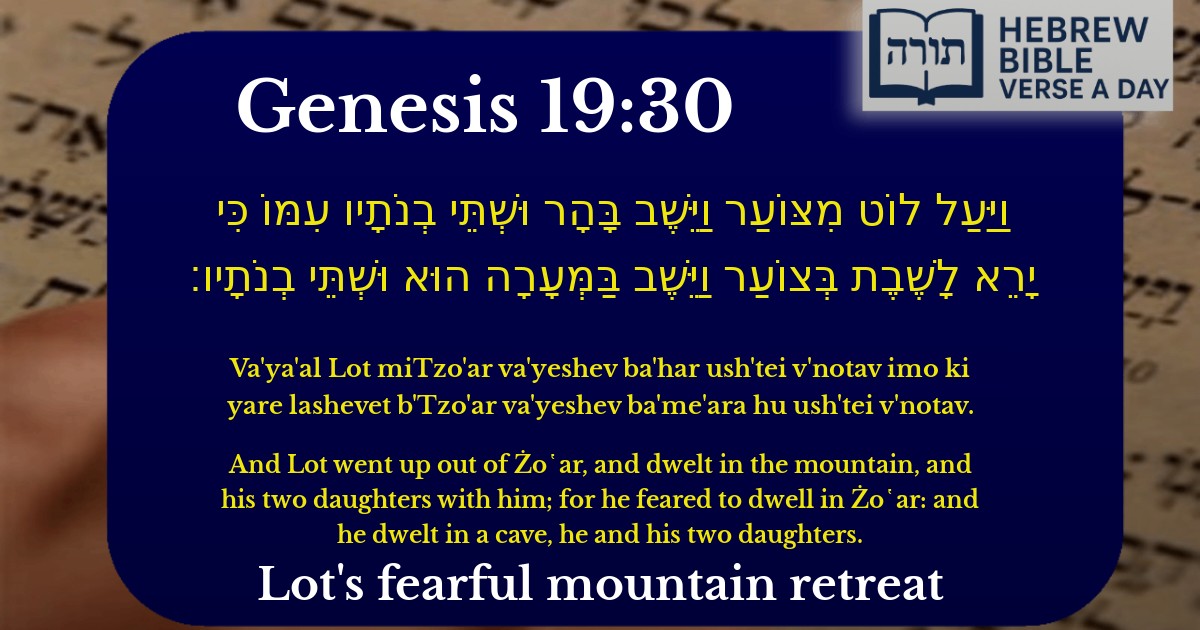Join Our Newsletter To Be Informed When New Videos Are Posted
Join the thousands of fellow Studends who rely on our videos to learn how to read the bible in Hebrew for free!
Hebrew Text
וַיַּעַל לוֹט מִצּוֹעַר וַיֵּשֶׁב בָּהָר וּשְׁתֵּי בְנֹתָיו עִמּוֹ כִּי יָרֵא לָשֶׁבֶת בְּצוֹעַר וַיֵּשֶׁב בַּמְּעָרָה הוּא וּשְׁתֵּי בְנֹתָיו׃
English Translation
And Lot went up out of Żo῾ar, and dwelt in the mountain, and his two daughters with him; for he feared to dwell in Żo῾ar: and he dwelt in a cave, he and his two daughters.
Transliteration
Va'ya'al Lot miTzo'ar va'yeshev ba'har ush'tei v'notav imo ki yare lashevet b'Tzo'ar va'yeshev ba'me'ara hu ush'tei v'notav.
Hebrew Leining Text
וַיַּ֩עַל֩ ל֨וֹט מִצּ֜וֹעַר וַיֵּ֣שֶׁב בָּהָ֗ר וּשְׁתֵּ֤י בְנֹתָיו֙ עִמּ֔וֹ כִּ֥י יָרֵ֖א לָשֶׁ֣בֶת בְּצ֑וֹעַר וַיֵּ֙שֶׁב֙ בַּמְּעָרָ֔ה ה֖וּא וּשְׁתֵּ֥י בְנֹתָֽיו׃
וַיַּ֩עַל֩ ל֨וֹט מִצּ֜וֹעַר וַיֵּ֣שֶׁב בָּהָ֗ר וּשְׁתֵּ֤י בְנֹתָיו֙ עִמּ֔וֹ כִּ֥י יָרֵ֖א לָשֶׁ֣בֶת בְּצ֑וֹעַר וַיֵּ֙שֶׁב֙ בַּמְּעָרָ֔ה ה֖וּא וּשְׁתֵּ֥י בְנֹתָֽיו׃
🎵 Listen to leining
Parasha Commentary
📚 Talmud Citations
This verse is not quoted in the Talmud.


Lot's Departure from Tzo'ar
The verse states that Lot "went up out of Tzo'ar" (וַיַּעַל לוֹט מִצּוֹעַר). Rashi explains that Lot initially sought refuge in Tzo'ar after fleeing Sodom, as it was a small city spared from destruction (Bereishit 19:20-22). However, he later left because he feared remaining there—either due to its proximity to the destroyed cities or because its inhabitants were also sinful, making it an unfit place to raise his daughters (Rashi on Bereishit 19:30).
Fear and Isolation in the Mountain
The phrase "כִּי יָרֵא לָשֶׁבֶת בְּצוֹעַר" ("for he feared to dwell in Tzo'ar") suggests that Lot recognized the spiritual danger of staying there. The Midrash (Bereishit Rabbah 51:8) elaborates that Lot, despite his flaws, retained some righteousness and thus distanced himself from further corruption. His choice to dwell in a cave (הַמְּעָרָה) reflects a desire for isolation, but also hints at his diminished status—once a wealthy resident of Sodom, now reduced to living in a cave (Ramban on Bereishit 19:30).
The Role of Lot's Daughters
The repeated mention of "וּשְׁתֵּי בְנֹתָיו" ("and his two daughters") emphasizes their presence in this precarious situation. The Talmud (Nazir 23a) discusses the moral complexities of their later actions, contextualizing them as misguided attempts to preserve humanity. However, here, their inclusion highlights Lot's responsibility as a father—his fear for their safety and morality drove him to seek seclusion (Sforno on Bereishit 19:30).
Symbolism of the Cave
The cave (מְּעָרָה) carries symbolic weight in Jewish thought. The Zohar (Bereishit 108a) associates caves with hiddenness and spiritual introspection. Lot's retreat there may signify a withdrawal from society, but also a missed opportunity for repentance—unlike Avraham, who actively sought divine connection, Lot remained passive (Kli Yakar on Bereishit 19:30).